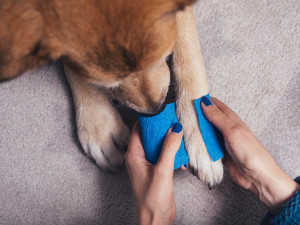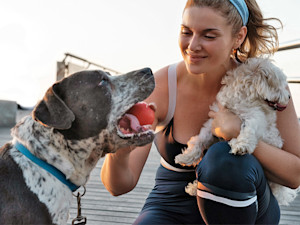Why Is My Dog Throwing Up Blood? Learn What This Means
Take action, but don’t assume the worst.

Share Article
In This Article:
What Does It Mean if Your Dog Throws Up Blood? What Causes Bloody Vomit? Is a Dog Vomiting Blood an Emergency? What to Do If Your Dog Is Throwing Up Blood How Is a Dog Throwing up Blood Treated? Can You Prevent Blood in a Dog’s Vomit?
When your dog throws up, it’s natural to feel a bit concerned, unless you recently shared a spicy bite of your dinner and suspect that’s the culprit. If it’s a one-time event and your dog seems fine, it’s usually nothing to panic over. But spotting blood in your dog’s vomit is a different story, and can instantly send your heart racing.
As pet parents, we’re hardwired to worry when we see blood, whether in vomit, stool, or during a cough. It’s an unmistakable sign that something isn’t right. In this article, we’ll help you understand what vomiting blood can mean for your dog’s health, and which steps to take next.

What does it mean if your dog throws up blood?
The appearance of blood in vomit can vary, depending on where it comes from in the digestive tract. If it’s bright red, it probably came from your dog’s mouth, esophagus, or upper stomach. The further down the intestinal system it comes from, the darker it appears due to its being partially digested.
Blood in your dog’s vomit is not a diagnosis, but a symptom. It can mean anything from a mild cut in your dog’s mouth to an ulcer to internal trauma. You won’t know which it is without your veterinarian’s help. So it’s essential to seek your vet’s help quickly.
Coughing up blood vs. throwing up blood
It can sometimes be confusing whether your dog vomited up blood (hematemesis) or coughed up blood (hemoptysis). This distinction is important, because if the blood was coughed up, it will tell your vet to look in the respiratory system for the cause. If it was vomited up, the GI tract should be the focus.
If you're unsure if your dog coughed or vomited, collect a sample and consult your veterinarian. This difference can guide the diagnostic process significantly.
What causes bloody vomit?
There are various causes for bloody vomit in dogs. They can be fairly harmless to serious. Examples include:
Gastrointestinal ulcers
Ingestion of foreign objects or toxins
Severe gastritis (inflammation of the stomach)
Liver or kidney disease
Coagulopathy (blood-clotting disorders)
Cancer (such as gastric tumors)
Parvovirus in puppies
Injury from bones or sharp objects
Medication side effects (such as from NSAIDs or steroids)
There are other causes as well, so it’s very important to find the culprit as soon as possible so your vet can begin treatment.
How do vets diagnose the cause?
If you take your dog to the vet for vomiting blood, the visit will always begin with giving your vet a thorough history, and your dog receiving a thorough exam. Based on the results of these two steps, the vet will determine which diagnostic tests may be needed, including:
Bloodwork (CBC, chemistry panel, thyroid test, clotting profile)
Fecal testing for parasites or occult blood
Abdominal X-rays or ultrasound
Endoscopy to visualize ulcers, tumors, or foreign bodies
Biopsies, if cancer or chronic inflammation is suspected
Sometimes, multiple tests may be needed to find the exact cause and determine the best treatment.
Is a dog vomiting blood an emergency?
The problem with answering that question is that it can be an emergency or could be something simple. But without seeing the veterinarian, it’s difficult to know. In many cases, yes, vomiting blood is an emergency. While mild stomach irritation might resolve on its own, you don’t want to risk missing something serious like internal bleeding or a perforated ulcer.
Emergency warning signs that require immediate veterinary attention include:
Lethargy or collapse
Pale gums
Rapid breathing or heart rate
Severe abdominal pain or bloating
Continuous vomiting or retching
Vomiting large volumes of bright red blood
Puppies, seniors, or dogs with chronic illnesses such as kidney disease or diabetes need special attention. They can easily become dehydrated or even go into shock.
What to do if your dog is throwing up blood
If your dog vomits blood, stay calm but act quickly. Take away any food or water that is accessible until you speak with your vet. Be prepared to describe the appearance of the vomit, or take a photo or a sample of it with you to the vet’s office. Note any additional symptoms like diarrhea, a painful abdomen, lethargy, or drooling.
Immediately call your veterinarian or the closest emergency hospital. Find out what their recommendation is. Do not give any human medications at home. Wait for your vet’s instructions.
How is a dog throwing up blood treated?
Treatment will depend entirely on the cause of the vomiting and any other symptoms. Here are examples of possible treatments.
Mild to moderate cases
Fluid therapy for dehydration
Antiemetic (anti-nausea) medications
Gastroprotectants (like sucralfate or omeprazole)
Dietary management with bland, easily digestible food
Severe or emergency cases
Hospitalization for IV fluids and monitoring
Blood transfusions if significant blood loss has occurred
Endoscopic or surgical intervention to remove obstructions or repair ulcers
Antibiotics for infections or sepsis
Treatment for coagulopathies, liver failure, or other systemic disease
The severity of the condition and the response to treatment will determine how long your dog may be hospitalized and if further diagnostics and treatments are needed.
Can you prevent vomiting blood in dogs?
Some things that cause vomiting in dogs can’t be prevented. Cancer, coagulopathy, liver failure, and other conditions may affect dogs regardless of how well you care for them. However, you can take steps to decrease the risk of other causes, such as the following.
Avoid unsafe treats and toys. Don’t give cooked bones or hard chews that can splinter or cause GI injury.
Use medications with caution. NSAIDs and steroids should only be used under veterinary supervision, especially in long-term cases.
Limit access to toxins. Keep household cleaners, human medications, and rodenticides out of reach. Watch for poisonous plants and mushrooms during walks.
Keep up with wellness checks. Routine vet visits can catch underlying issues early, such as kidney or liver disease. Screen for parasites, especially in puppies and outdoor dogs.
Feed them a safe, balanced diet. Stick with quality pet food. Avoid fatty table scraps or spoiled foods that may trigger gastritis or pancreatitis.
Bottom line
Vomiting blood in dogs is never something to ignore.
Whether it’s a minor stomach upset or a sign of a severe disease, only your vet can determine the cause and guide treatment.
The earlier you seek help, the better the outcome for your dog.
References
Chandler, Marge. “Vomiting in Dogs and Cats — Is It Medical or Surgical?” In Practice, vol. 32, no. 3, Mar. 2010, pp. 82–89. https://doi.org/10.1136/inp.c746opens in new tab.
Elwood, C., et al. “Emesis in Dogs: A Review.” Journal of Small Animal Practice, vol. 51, no. 1, 24 Dec. 2009, pp. 4–22. https://doi.org/10.1111/j.1748-5827.2009.00820.xopens in new tab.
Hatcher, Robert A. “The Mechanism of Vomiting.” Physiological Reviews, vol. 4, no. 3, 1 July 1924, pp. 479–504. https://journals.physiology.org/doi/abs/10.1152/physrev.1924.4.3.479opens in new tab.

Dr. Shelby Neely, DVM
Dr. Shelby Neely is a freelance writer and veterinarian who graduated from the University of Pennsylvania School of Veterinary Medicine and has practiced veterinary medicine for 30 years, specializing in small animals. Her work has appeared in Allivet, AsktheCatDoctor, WhiskerDocs, Ask the Cat Doctor Radio, Ask the Cat Doctor TV, and numerous other websites, brochures, newsletters, newspapers, and ebooks. In her spare time, Dr. Neely likes to spend time with her three children, two grandchildren, three cats, two grand-cats, and five grand-dogs.
Related articles
![A black dog with a tilted head looks attentively at the camera while sitting in grass.]()
Is My Dog’s Poop Normal?
From bloody poop to diarrhea—all your dog’s poop problems explained.
![Woman comforting her black Dachshund dog at home.]()
10 Reasons Why Your Dog Throws Up in the Morning
Some are more concerning than others.
![Woman playing with her dog and his ball outside.]()
Why Does My Dog Foam at the Mouth?
When to see a vet and when you shouldn’t panic.
Why Is My Dog Peeing Blood?
That can’t be good...
![A mini golden doodle puppy licking and grooming itself.]()
Treatment for Your Dog’s Bleeding Anus: Home Remedies and Medical Options
It’s not a pretty problem, but here are your solutions.
![Red-haired woman holding sleeping dog in her lap on the bed]()
6 Reasons Your Dog Is Vomiting
And how to help them feel better fast.







